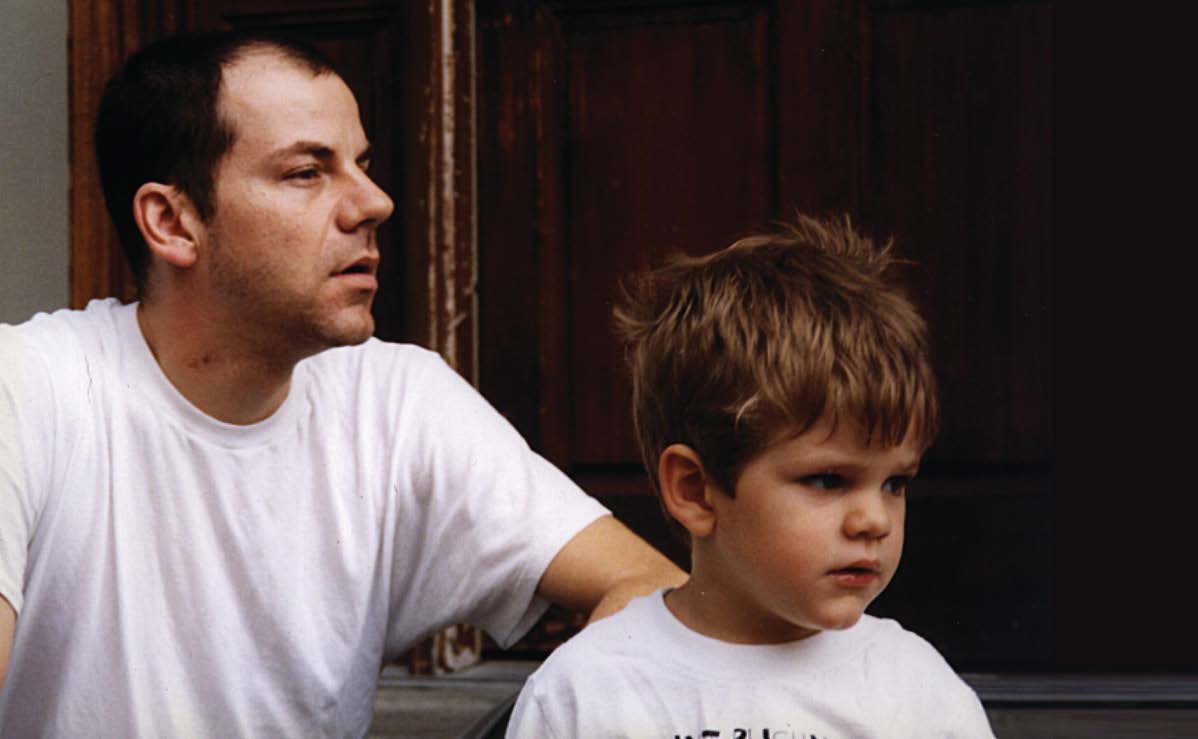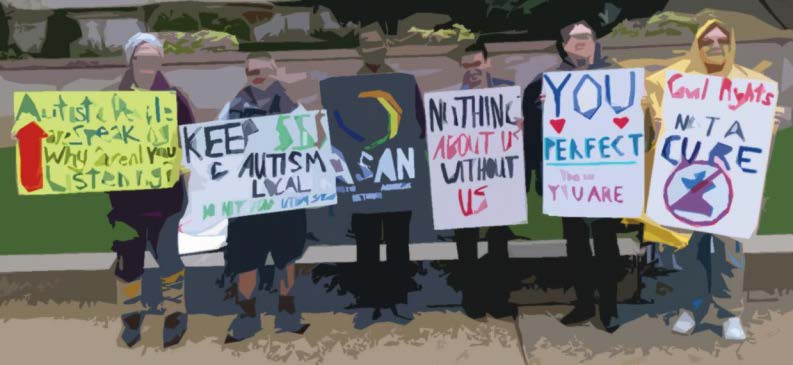BY MICHAEL JOHN CARLEY
Author's Note This article is reworked from a 2018 piece written – with thanks for fabulous editing help from Saman Kamgar-Parsi and Sherri Alms – for the Organization for Autism Research1

MY GENERATION: The author with his son; "His generation keeps me honest. They allow me to see that our autism world has become complacent. There are so many true heroes from those 15 years past – famous folks! – who, today, are unsuccessfully struggling to maintain relevance. It's tough to watch, especially because I could be next."
Remember when "tolerance" was thought to be a stepping stone of social progress, even though it emanated a clear, condescending subtext of "Oh, wellllllll, if I haaaave to…"? At the time, we thought the concept of racial tolerance, or religious tolerance, was revolutionary. In the ensuing years thereafter this morphed into "awareness," which too often could imply that "we wanted to make you aware that autistic lives are worth very little."
PHOTOS PROVIDED BY MICHAEL JOHN CARLEY
Well, time passes, and today we can sniff out ethical flaws with a lot more accuracy. But what's consistent with nearly every stage of progress is that we frame the milestones – such as our use of the current word "acceptance" – as conclusions. It's always the end of a journey, a road, or even a "battle." Especially in the autism world, we imagine ourselves having collapsed in frustration just as we reach "the end," i.e. whatever new word we're at. Would it be more productive if these steps were instead thought of as beginnings, births, or dawns?
the context of "Acceptance"
Last year, the Organization for Autism We're not done. My spectrum son is 22 now. And as I wrote in a 2017 Father's Day piece for NEXT for Autism, he sees all the advocacy work that we accomplished 10 to 15 years ago as helpful, but he doesn't want to emulate it. MY GENERATION: The author with his son; "His generation keeps me honest. They allow me to see that our autism world has become complacent. There are so many true heroes from those 15 years past – famous folks! – who, today, are unsuccessfully struggling to maintain relevance. It's tough to watch, especially because I could be next." Research asked me to write about the concept of autism "acceptance." Sitting down, I thought: "I know what acceptance feels like in the present – equal employment opportunities, policies of inclusion, being surrounded by a real community, and people that care about or love me. But what does acceptance look like in the future? I know how the context of DSM*-5's present-day definition of autism resonates with the world, but what will (picking a future edition at random) 'DSM-14' look like?" I wondered how autism will be defined then. Or… will my and others' behavioral differences simply disappear from the DSM because they are then thought of as natural, commonplace extensions of the human experience? Remember that autism and Asperger's are not finite medical diagnoses that we get from an x-ray or a blood test. They are neurological, and therefore bestowed somewhat arbitrarily by the observance of interpreted behavioral differences.
Our current acceptance then, of anything that differs from a majority mindset is usually the precursor to respect, which is followed by celebration, after which comes dismissal because that which once required acceptance doesn't need accepting anymore. My point isn't to blow your mind with perspective, evade critical thinking through "semantic contrarianism," or to idiotically tell you that we're all one, big, happy family. It's instead to suggest we look at context when evaluating progress.
"Accepted" to What degree?
We all know what Stockholm Syndrome is, right? Where (at the risk of banalizing the condition) you have to think of your perpetrators/captors as far nicer people than they are, lest your stress/despair levels reach potentially-fatal heights. The gut reaction of acceptance through the filter of Stockholm Syndrome, is therefore… pretty inaccurate. And when I moved to New York City for grad school, the city seemed to scream at me, "Michael John, we love you!!!" and I thrived off this for 28 years. Now I live in Wisconsin, where they are NOT crazy about people with behavioral differences. I'm constantly reminded of the disapproval I felt as a 1970s New England schoolkid. New York in 1986 was twenty times more behaviorally permissive than both that culture, as well as 2019 Wisconsin.
Are all these perceptions of acceptance simply relative then? Perhaps filled with societal conditions that warp our ability to decipher if we're really being accepted?
Always Ask What's next
Many people treated the 2015 Supreme Court ruling that legalized same-sex marriage as the end of an incredibly long, socio-political battle. But it wasn't. (In addition to what will be an arduous task to make sure the new laws are enforced) It was the beginning of a long, socio-political battle over the rights of all differing relationship structures outside of one man and one woman. For what about relationships between not just two men, or two women, but maybe incidents, however rare, where there are three, four people in the relationship, maybe more... structures where rights must be extended beyond two adults because there are children who rely on more than two adults? For example, the qualification for many low-income family housing programs is defined by the combined incomes of two parents/caregivers. Well, what if one family can't qualify therein, but when you add the income of the third adult in the relationship, the family now qualifies?
We're not done
My spectrum son is 22 now. And as I wrote in a 2017 Father's Day piece for NEXT for Autism,2 he sees all the advocacy work that we accomplished 10 to 15 years ago as helpful, but he doesn't want to emulate it. Where we see identity, he often sees pathology, and quite frankly that's a credit, not a discredit, to the work we all did. His generation keeps me honest. They allow me to see that our autism world has become complacent. There are so many true heroes from those 15 years past – famous folks! – who, today, are unsuccessfully struggling to maintain relevance. It's tough to watch, especially because I could be next. My parents' generation marched for civil rights, yet have often displayed what is now interpreted as a colonialist mindset. I have a loving grandmother, one who partially raised me, and who was instrumental in Planned Parenthoods' growth in New England… yet whose sexual values were proudly, repressively Victorian. Despite the welcome increase in our present emphasis on diversity (i.e. flexibility), we are contradictorily also becoming more tribal (i.e. inflexible). We don't romantically couple across class lines like we used to. We can now easily predict, and pigeonhole one's voting tendencies just by looking at the individual's skin color, education, and whether or not they live in a rural or urban community.

TIMES A CHANGIN': Autism protest (art by the author); "Our noses for that which is progress either become keener, or they stop working. Who knows – maybe in 50 years, what we consider acceptance today will be regarded as outright bigotry."
And then, to add additional context to all of this head-spinning change, there is "the intersectionality component," where there is flexibility amidst the inflexibility, and to which I can personally provide a clear example…
I'm Irish. And paternally I come from one of those Irish families where most of the men would need to quit drinking at some point. In my family, some did, some didn't. But I was lucky and got out at a young age (27). Yet I am also one of few ex-drinkers who is insanely glad that I once drank. As a spectrum individual in a world that (back then, mind you) didn't tolerate spectrum behaviors, alcohol numbed my symptoms and lessened social anxiety. But, more important (and the reason I bring this up), is because my drinking allowed me entry into a phenomenon that one doesn't see much of these days – old people and young people connecting. Irish men across differing generations all know many of the same songs, and they like to sing them loudly together. Ok. Maybe the influence of booze invites outsiders to invalidate this phenomena, because in the beginning, the booze definitely helps to give you the courage to try singing old songs with grownups. But it's not a tradition that thereafter needs booze, (and I should know). This Irish inter-generational bonding is quite rooted in the songs about the famine,‡ or the troubles;€not the booze; possibly because we have a somewhat tortured sense of our origin, and that, like Cajun, black, and Jewish cultures (among others I'm neglecting), we somewhere long for the land of our origin, ancestral homes that were left under sad circumstances. We also retain a need to articulate having once felt so unwelcome after emigration. And finally, we're also just really good songwriters.
Well, where else other than Irish bars in London or New York can you find differing generations belting out the same lyrics† with such large and equal passion? Where they all hug after the night is over, or after a special song… drunk or not… Talk about a beautiful example of "acceptance" that works both ways...
conclusion
Time is cruel. It passes, and our noses for that which is progress either become keener, or they stop working. Who knows – maybe in 50 years, what we consider acceptance today will be regarded as outright bigotry. And to wax slightly dramatic… maybe half of whatever acceptance of death we end up with is due to the fact that our "worlds" don't exist anymore.
As in philosophy, there are never answers – just better and better questions as we move along…all containing results that are out of our hands.
What we can change is the atmosphere of the road trip. And if we can try to include more context, we might get to whatever the next step is a lot quicker. Because if acceptance really were a finish line, then we would think of that long journey as filled with only the opposite of acceptance – rejection, and pain. We will get to that unimaginable, better, next step. It's inevitable. We just don't know when or how.
So why not instead consider acceptance to be a birth, and feel energized, warm, confident, optimistic, and, dare I say it, loved a lot more on our next journey? Because acceptance is great… for now.•

ABOUT THE AUTHOR: Michael John Carley is the founder of GRASP, a school consultant, and the author of Asperger's From the Inside-Out (Penguin/Perigee 2008), Unemployed on the Autism Spectrum, (Jessica Kingsley Publishers 2016), the upcoming Book of Happy, Positive, and Confident Sex for Adults on the Autism Spectrum… and Beyond!, and the column, "Autism Without Fear." In 2000, he and his son were diagnosed with Asperger Syndrome. When reevaluated in 2014 under DSM-5, Carley was diagnosed with autism spectrum disorder. For more information on Carley or to subscribe to his updates, go to michaeljohncarley.com
References * Diagnostic and Statistical Manual of Mental Disorders (the shrink's bible). ‡ The British-induced "potato famine" of the 1840s caused the largest wave of Irish emigration to both America and the UK. € Refers to the conflict in Northern Ireland from the 1960s-1998, the planet's most recent example of an occupying army that remains in the land it invaded. † What made the band "The Pogues" so special when they emerged in the mid-1980s wasn't even their revolutionary blending of folk music with punk rock rhythms, or the songwriting ability of Shane MacGowan. It was that despite their punk rock aura, that in addition to their predictable fan base, that Irish senior citizens absolutely loved them as well. Furthermore, the Pogues welcomed this, and never took them for granted. 1. researchautism.org/acceptance-is-a-start-not-a- finish/?utm_source=OARacle+Newsletter+Subscribers&utm_campaign=f6167e4f85OARacle+October+Issue+2017&utm_medium=email&utm_term=0_132914a232-f6167e4f85142287273 2. nextforautism.tumblr.com/post/161964350534/its-fathers-day-so-what